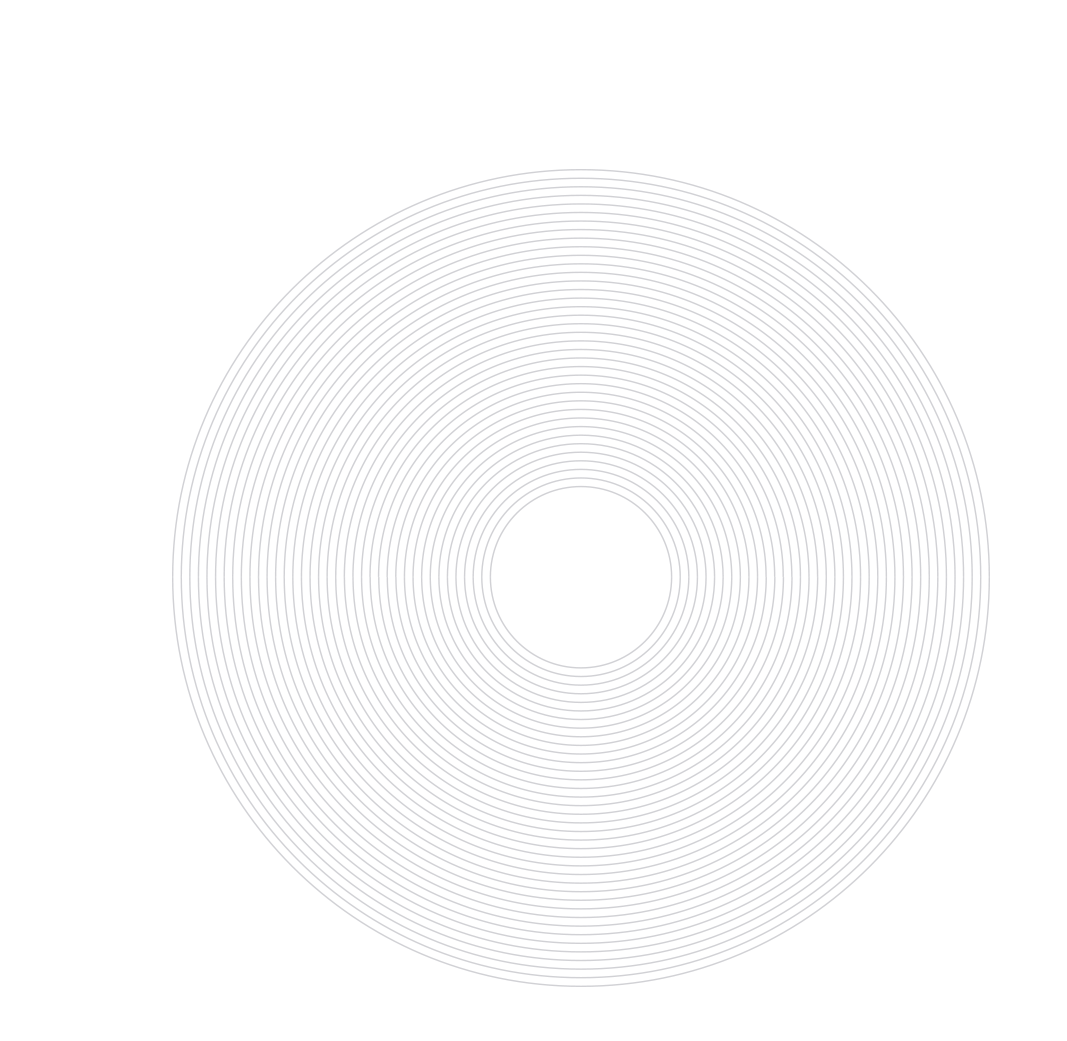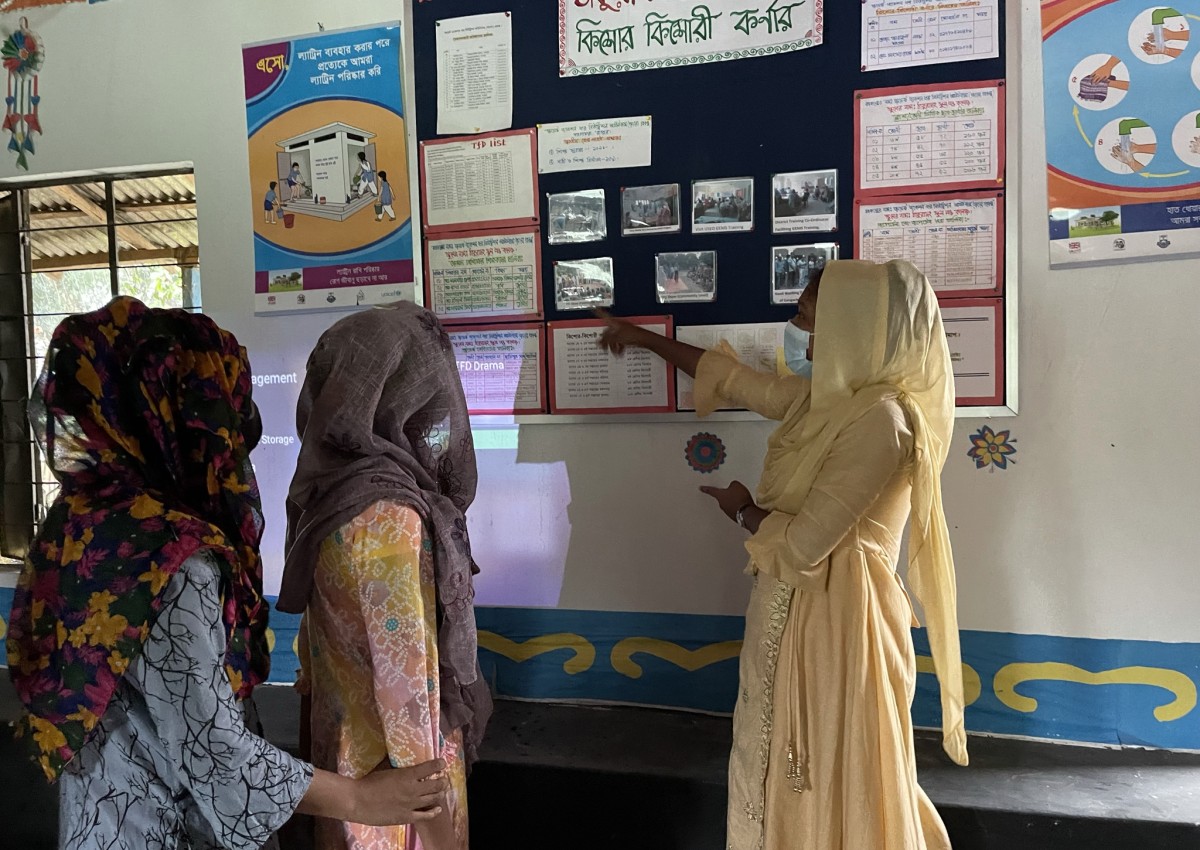





A learner from JANO’s Adolescent Corner showing their learning from the board.
The ongoing COVID-19 pandemic is a major threat towards public health, and people are trying to keep safe by maintaining health practices and getting vaccines. However, it has also brought other implications and imposed additional difficulties for the people across all social strata. At present, CARE Bangladesh implements numerous projects across multiple regions and districts in Bangladesh. The North belt of Bangladesh is one of the key areas of activity where programs are actively working in the thematic areas of Health, Nutrition, Food Security, Resilience, Social Enterprise, and Water, Sanitation and Hygiene.
 The Joint Action for Nutrition Outcome (JANO) project, funded by EU International Partnerships and Austrian Development Agency, works with the Government of Bangladesh to scale innovative models for better nutrition outcome. It works at the regional and local levels, to support the effective implementation of the National Plan of Action for Nutrition 2 (NPAN-2). In Gagachora Upazila of Rangpur district, JANO is working at field level with interventions such as Adolescent Corner and School Garden, followed by a meet-up with Community Support Group (CSG) members. Physical school activities were off for well over a year due to the ongoing pandemic induced restrictions, but now, the students have gradually started going back to schools. A group of students expressed their happiness for being able to go back to school. Kaifa, a student of Class 10 shared, “We have many things to learn from adolescent corners regarding our health, hygiene, nutrition. Initially, we felt shy. But now we know that this information is very important for all adolescents. For this reason, I felt that there should be an adolescent corner in every school”.
The Joint Action for Nutrition Outcome (JANO) project, funded by EU International Partnerships and Austrian Development Agency, works with the Government of Bangladesh to scale innovative models for better nutrition outcome. It works at the regional and local levels, to support the effective implementation of the National Plan of Action for Nutrition 2 (NPAN-2). In Gagachora Upazila of Rangpur district, JANO is working at field level with interventions such as Adolescent Corner and School Garden, followed by a meet-up with Community Support Group (CSG) members. Physical school activities were off for well over a year due to the ongoing pandemic induced restrictions, but now, the students have gradually started going back to schools. A group of students expressed their happiness for being able to go back to school. Kaifa, a student of Class 10 shared, “We have many things to learn from adolescent corners regarding our health, hygiene, nutrition. Initially, we felt shy. But now we know that this information is very important for all adolescents. For this reason, I felt that there should be an adolescent corner in every school”.
The Head Teacher of the school, Md. Moksedul Huq also shares that, “Adolescent corner is contributing to creating a basic learning opportunity for students. This learning will help students to be non-violent, health-conscious, and sensitive. From the play materials, they learn about the nutritional value of different foods. They also can calculate their BMI and consciously understand their nutrition status. Through learning videos, they are getting clear messages for adolescent changes. In the vegetable garden, we grow seasonal vegetables. Working in the vegetable garden gives the students a first-hand learning experience which they can utilize in their own house and also know which vegetable have better nutrition values. The students are learning all these useful lessons because of JANO project’s initiatives.”
The Social Enterprise called Living Blue produces high-quality, hand-made products dyed naturally using Bengal Indigo to retail in high-end markets, under its own label. However, the pandemic led to some serious challenges. The global luxury marketplace was also closed for a significant duration causing lack of sufficient orders to ensure smooth operations. The supply chain is also interrupted due to scarcity of raw materials, series of lockdowns and movement restrictions, and price hike of fabrics.
These challenges were mitigated with additional effort from the project, where donors extended their support by hiring a consultant to design and develop products targeting the local market, and to develop marketing strategy and connect to the retail network. Also, Micro Health Insurance was launched to facilitate access to health services to ensure physical wellbeing of the households engaged with Living Blue. Besides these, cash support, distribution of safety items (face masks, hand sanitizers, liquid soaps, face shields), and installation of two hand wash stations at Living Blue atelier has been completed to ensure safety of the artisans.
 Strengthening Household Ability to Respond to Development Opportunities (SHOUHARDO) III is a Resilience Food Security Activity (RFSA) that aims to achieve improved gender equitable food and nutrition security and resilience for 170,298 Poor and Extreme Poor (PEP) households living in the eight districts of Northern Char and Haor wetland areas of Bangladesh. The program is funded by United States Agency for International Development (USAID) and the Government of Bangladesh (GoB). Rajarhat subdistrict under Kurigram district is one of the program locations that is highly prone to monsoon floods, river erosion and subsequent seasonal migration.
Strengthening Household Ability to Respond to Development Opportunities (SHOUHARDO) III is a Resilience Food Security Activity (RFSA) that aims to achieve improved gender equitable food and nutrition security and resilience for 170,298 Poor and Extreme Poor (PEP) households living in the eight districts of Northern Char and Haor wetland areas of Bangladesh. The program is funded by United States Agency for International Development (USAID) and the Government of Bangladesh (GoB). Rajarhat subdistrict under Kurigram district is one of the program locations that is highly prone to monsoon floods, river erosion and subsequent seasonal migration.
Since the outbreak of the Pandemic, the program realigned its activities to address the new challenges as a result of the pandemic. Under program influence, Village Development Committee (VDC) members of Mohidhorkhandokheta Village in Chhinai Union, worked with the community to register for taking the COVID-19 vaccine, while they themselves registered before to set an example. Through engaging means street drama, the adolescent and youth group under the program are raising awareness amidst the community of how the pandemic has affected their studies, drop-out rates and increased child marriages. The program is also working with local community for alternative livelihood arrangement where locals receive handicrafts training and technical skill training. These additional skills help the community build a resilient livelihood option that will help sustain during seasonal natural crises.
The ‘GoB-UNICEF ASWA-II’ project works to achieve the desired positive public health impact from zero open defecation, use of improved sanitation facilities, safe hygiene behavior and ensuring safety sustainability of safe water through arsenic-safe union and water safety communities’ declaration.
 One of the villagers named Khalilur Rahman from Barabil Union of Gangachara Upazila, Rangpur shared, “We drink safe water and our village is now open defecation free. As a result, our medical expenses have reduced. We had less knowledge/understanding about COVID-19. CARE staff helped us understand the right practices for preventing COVID-19 and taught us correct technique of handwashing, wearing masks and vaccination.”
One of the villagers named Khalilur Rahman from Barabil Union of Gangachara Upazila, Rangpur shared, “We drink safe water and our village is now open defecation free. As a result, our medical expenses have reduced. We had less knowledge/understanding about COVID-19. CARE staff helped us understand the right practices for preventing COVID-19 and taught us correct technique of handwashing, wearing masks and vaccination.”
Recently, Hasina Rahman, Deputy Country Director – Program Support of CARE Bangladesh visited the project activities in the Northern belt and shared her encouraging spirit with the project staff and participants. She was also inspired by the enthusiasm and resilience of the colleagues who have been performing their responsibilities through this challenging time in the pandemic.
 She was delighted to see the participants happily sharing their achievements and way of work. The determination of the program participants and the staff to continue their work amidst the adversities of COVID-19 is remarkable.
She was delighted to see the participants happily sharing their achievements and way of work. The determination of the program participants and the staff to continue their work amidst the adversities of COVID-19 is remarkable.
Other visiting team members during her visit were Hamidur Rahman, Field Operation Coordinator, Shanjib Kumer Das, General Manager- Administration and TSD, A.N.M Kaiser Zillany (TL), Md. Sarwar (TC-MEL) and Samsad Najnin (TC-Gender & SBCC).
© Copyright 2026 CARE Bangladesh. Powered By Bangladesh Online